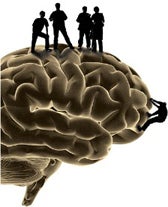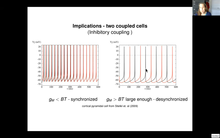8:30 Refreshments
9:00 Welcome
9:15 Speaker
John Maunsell
- Title: Breaking Down Attention: Distinct Contributions from Neurons in Different Brain Regions
- Affiliation: University of Chicago
- Abstract: Although the neurophysiological correlates of attention have been studied for decades, we have no universally accepted definition of what attention is. The term is used to describe a range of phenomena, including arousal, selection and executive control. While this approach has provided a wealth of information about the neuronal correlates of attention, a detailed understanding of its nature remains elusive.
We have been working to reach a more precise definition of attention. We have focused on spatial visual attention, which is associated with stronger responses from individual neurons in visual brain structures. We have employed the well-developed framework of signal detection theory. Signal detection theory describes perceptual performance using two distinct parameters: behavioral sensitivity and behavioral criterion. When people attend to a visual field location, their sensitivity increases at that location and their behavioral criterion for detecting targets is lowered there. Both these changes contribute to more targets being detected at the attended location. We found that rhesus monkeys performing visual spatial attention tasks also change both their behavioral sensitivity and criterion, raising the question of whether behavioral improvements associated with changes in sensitivity and those associated with changes in criterion are supported by different neurobiological mechanisms.
Using monkeys trained to do visual spatial attention tasks in which shifts in attention were associated exclusively with changes in behavioral sensitivity or exclusively with changes in behavioral criterion, we tested whether changes in neuronal responses in different brain structures are preferentially associated with one or the other. We found that attention-related changes in neuronal responses in some structures are associated exclusively with changes in behavioral sensitivity, whereas the activity of neurons in others are associated with attention-related changes in criterion.
10:30 Coffee Break
10:45 Speaker
Paul Thagard
- Title: Procedural Creativity in Art and Science
- Affiliation: University of Waterloo
12:00-1:30 Lunch
1:30 Speaker
Michael Arbib
- Title: Computational Challenges of Evolving the Language-Ready Brain
- Affiliation: USC
- Abstract: I show how computational modeling of the macaque brain may ground hypotheses on the brain of LCA-m (the last common ancestor of monkey and human) and elaborations thereof on the path from a mirror system for manual action to a "language-ready brain" in Homo sapiens. Building towards neurolinguistics: Building on this, I assess challenges to computational neuroscience in addressing the questions: How do structures of the brain of a modern adult human support the use of language? What may have been the “initial state” for early Homo sapiens, and how did cultural evolution yield the transition to humans with language-rich cultures?
2:45 Coffee Break
3:00 Speaker
Vinod Menon
- Title: Unifying Models and Theories of Human Brain Function and Dysfunction
- Affiliation: Stanford University
4:00 Reception (E7 Event Space - 2nd Floor)
Past brain day lecturers include: William Seager, Marisa Carrasco, Konrad Kording, James DiCarlo, Daniel Dennett, Daniel Schacter, Paul Glimcher, David van Essen, Patricia Churchland, William Bechtel, Geoff Hinton, Jack Gallant, Ned Block, Carl Craver, Terry Sejnowski, Keith Holyoak, Peter Strick, Jay McLelland, Tony Movshon, Jonathan Cohen, Larry Barsalou, Sebastien Seung, Mel Goodale, John Hopfield, Jesse Prinz, David Sheinberg, Gyorgy Buzsaki, Ian Gold, Michael Tarr, and Michael Hasselmo.
 The brain is a horrendously complex and poorly understood system that poses both an immense challenge - and possibly rich rewards - to neuroscientists, psychologists, philosophers, and computer scientists. To celebrate Waterloo's Centre for Theoretical Neuroscience, which integrates these approaches to the brain, and to highlight the already established Cognitive Science Program, we have invited four internationally renowned speakers to present generally accessible lectures from each of these perspectives.
The brain is a horrendously complex and poorly understood system that poses both an immense challenge - and possibly rich rewards - to neuroscientists, psychologists, philosophers, and computer scientists. To celebrate Waterloo's Centre for Theoretical Neuroscience, which integrates these approaches to the brain, and to highlight the already established Cognitive Science Program, we have invited four internationally renowned speakers to present generally accessible lectures from each of these perspectives.






